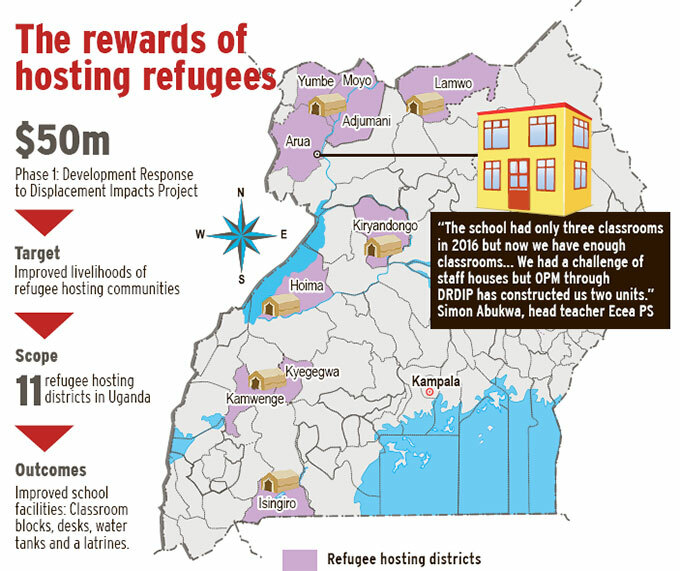Uganda reaps from hosting refugees
“Having refugees is a blessing because we have benefited"
Eight-year-old Joseph Okure struggles to write in his book as other pupils push him to get space in the classroom.
Okure is one of the 150 pupils crowded in one of the classrooms at Bweyale Public Primary School in Kiryandongo district.
They have no desks and sit on the dusty classroom floor. For Okure to write, he sometimes puts the book on the fl oor, on a classmate's back, holds it in the air or leans against the wall.But with the crowding, it makes writing almost impossible.
"I am used, but I always feel bad to sit on the dirty fl oor," Okure says.
During the rainy season it gets worse since children have to walk in with muddy feet.
"By the time I leave school, my uniform and books are all dirty,"Okure says.This happens to all the pupils from Primary One to Primary Three which accounts for at least 700 pupils.
Appeal for desks
Kate Kia, the Primary Three teacher, says the pupils are not learning as far as writing is concerned."Majority cannot write well. If pupils with desks are writing poorly what about those without," Kia says.
She reveals that as young learners they need desks to support them. A report by the United Nation Education, Scientific and Cultural Organisation (UNESCO) says: "Furniture is an integral component of providing an appropriate learning environment. Uncomfortable and unsuitable furniture can cause problems varying from backache to writing difficulties, thus reducing learning opportunity."
For over five years, the school has been lacking desks due to high enrolment following the influx of refugees, Brenda Atugonza, the deputy headteacher of the school, says. The school has 1,400 pupils with about 600 being refugees.
In Kiryandongo, the refugees have been resettled at Panyadoli Refugee Camp and a big number of them have also settled in Bweyale town near the school.
"They send their children here and this has helped with integration. They are good people, but we are overwhelmed since there was no planning for their arrival in the school," Atugonza says.

The same situation is happening at Kasenyi-Lyato Primary School in Hoima district where Primary One pupils sit on the fl oor. Lydia Kusiima, the headteacher, says the school has 880 pupils with over 400 refugees from the Democratic Republic of Congo.
"We cannot deny them education because it is a right for every child," Kusiima says.
At Kiryandongo Seed School, four classes share two classroom blocks separated by papyrus mats. The laboratory is housed in the headteacher's offi ce. Government-aided schools near to refugee camps lack desks for pupils in lower primary and have a shortage of latrines due to the increased population.
"We have been using the same latrines with teachers and sometimes have to walk to the next school which is about 900 metres to access the latrine," Sheila Apio, a student of Kiryandongo Seed SS, says.
Government moves in
Following these challenges, the Government through the Office of the Prime Minister has moved to support these schools under the Development Response to Displacement Impacts Project (DRDIP).
At least $50m was injected in the first phase of the project.
In total 97 schools have been funded and received three classroom blocks, desks, five stance latrines and water tanks.The project aimed at improving the livelihood of refugee — hosting communities increases socio-economic as well as infrastructure.
Currently the above schools have been supported with six classroom blocks each, desks, water tanks and latrines. The facilities are yet to be commissioned for use.
Charles Ntairehoki Amooti, the Kiryandondo district LC5 chairperson, says the schools serving refugees have been supported.
More benefits
He adds that having refugees in the district has been a blessing since they can see tangible benefits in form of classrooms, roads, and health facilities which have been improved.
Funded by the World Bank, the projects are implemented for five years in 11 refugee hosting districts of Yumbe, Arua, Hoima, Koboko,Kyegegwa and Isingiro. Others are Moyo, Lamwo, Adjumani and Kiryandongo districts.
"Having refugees is a blessing because we have benefited. Before DRDIP, these schools were struggling," Ntairehoki says.Donath Eswalu, the Arua district chief administrative office, says the project has eased tensions between refugees and local communities.
Improved relations
"The project has greatly improved the relationship between the refugees and the host communities. They now see the benefi ts of hosting refugees which was a missing point in the past," Eswalu says.
Simon Abukwa, the headteacher of Ecea Primary School, says the school had only three classrooms in 2016, but now we have enough classrooms for all the pupils after being supported by various stakeholders.
We had a challenge of staff houses, but Office of the Prime Minister through DRDIP has constructed us two units which will house more teachers. The school has 2,987 pupils with only 438 locals.
Robert Dramwi, the community project management committee chairperson, says the project was timely since some of the pupils were studying under a tree."I feel great as a parent that by hosting refugees now our schools are supported," Dramwi says.